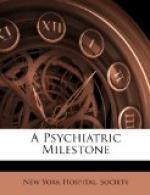It is natural enough that psychiatry should have erred in some respects. We had forced upon us the herding together of larger numbers of patients than can possibly be handled by one human working unit or working group. The consequence was that there arose a narrowing routine and wholesale classifications and a loss of contact with the concrete needs of the individual case; that very often progress had to come from one-sided enthusiasts or even outsiders, who lost the sense of proportion and magnified points of relative importance until they were supposed to explain everything and to be cure-alls. We are all inclined to sacrifice at the altar of excessive simplicity, especially when it suits us; we become “single-taxers” and favor wholesale legislation and exclusive State care when our sense for democratic methods has gone astray. Human society has dealt with the great needs of psychiatry about as it has dealt with the objects of charity, only in some ways more stingily, with a shrewd system and unfortunately often with a certain dread of the workers themselves and of their enthusiasm and demands. Law and prejudice surrounded a great share of the work with notions of stigma and hopelessness and weirdness—while to those who see the facts in terms of life problems there can be but few more inspiring tasks than watching the unfolding of the problematic personality, seeking and finding its proper settings, and preventing the clashes and gropings in maladjustments and flounderings of fancy and the faulty use and nutrition of the brain and of the entire organism.
What a difference between the history of a patient reported and studied and advised by the well-trained psychiatrist of to-day and the account drawn up by the statistically minded researcher or the physician who wants to see nothing but infections or chemistry and hypotheses of internal secretion. What a different chance for the patient in his treatment, in contrast to what the venerable Galt of Virginia reports as the conception of treatment recommended by a great leader of a hundred years ago: “Mania in the first stage, if caused by study, requires separation from books. Low diet and a few gentle doses of purging physic; if pulse tense, ten or twelve ounces of blood [not to be given but to be taken!]. In the high grade, catch the patient’s eye and look him out of countenance. Be always dignified.




